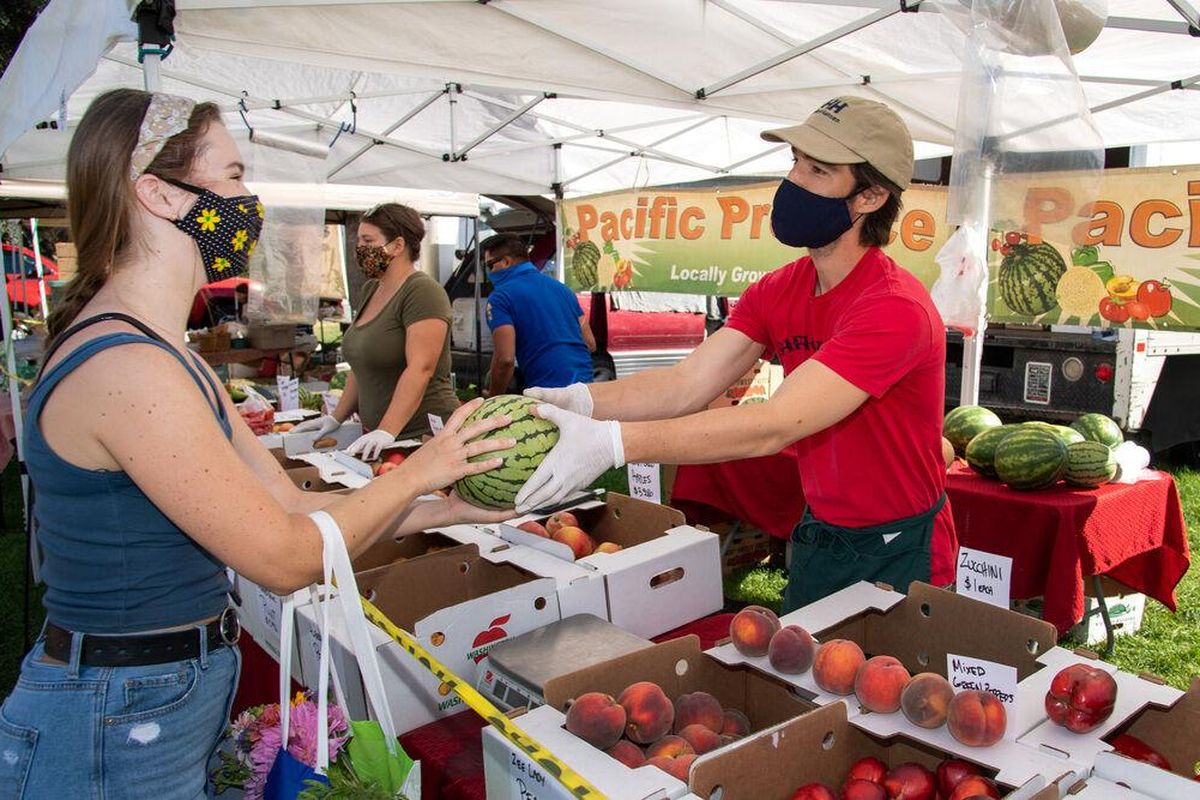‘Nourish your soul’: Spokane farmers’ markets provides buyers, sellers stability during pandemic

Among tent booths selling raw honey, locally grown vegetables and myriad fresh baked scones, the most obvious sign Saturday that something is different about the Spokane Farmer’s Market this year was the yellow caution tape preventing shoppers from getting too close to the vendors.
The market on Fifth Avenue, between Division and Browne streets, is one of a handful of Spokane farmers’ markets that has powered through the pandemic.
Some Spokane business owners say the thriving markets have saved their operation.
Megan Claflin, who was working a vegetable stand on Saturday, said regular customers still come to get their groceries every week.
“You need food and community to nourish your soul right now,” Claflin said.
The outdoor farmer’s market is one of about 10 in the Spokane area, but its focus on fresh produce draws grocery shoppers. Others focus more on crafts and treats, but all are filled with booths run by local business owners.
About 1½ miles away, Stacie and Tim Kearney sold fresh bread from their stall at the new Wonder Saturday Market, which started this year on the north bank of the Spokane River and features about 20 sellers.
Stacie, the owner of Lucky Lady Bread Company, said her business started three years ago on Instagram, graduated to offering pop-up events and has grown with the stability of the weekly market.
With COVID-19’s impacts on all businesses, Stacie said the market has not only saved her business but also allowed it to grow, if slowly.
“Had this not been here, my business would’ve halted completely,” Stacie said.
One of Lucky Lady’s regular customers, Chantal Slider, also started in the farmers’ market business this year with her shop, Zari’s House, named after her daughter.
There, she sells herbs, printed photos she and her daughter have taken around the world, hand-painted burlap coffee bags from Indaba Coffee in Spokane, and pottery she makes at a local studio, the Clay Connection.
“It’s just her expressing herself and it’s all local, from the coffee bags to where she does her ceramics,” said Eleneal Rosas, Slider’s friend and coworker at the booth. “It’s just beautiful.”
The one-on-one connection between buyers and sellers at local markets is what creates community, Slider said. Recently, a shopper brought Slider a shovel and a photo of his childhood home, she said. He asked her to paint the house he grew up in on the shovel as a gift for his sibling.
“That’s definitely unique to the market,” Slider said.
Stacie said her shoppers worried about the virus can talk with her directly about her processes and cleanliness and “they’re able to engage and connect with their food.”
Back at the Spokane Farmers’ Market, Claflin described the difference between two nectarines to a customer.
“The white are a sweet – pinot gris kind of sweet – and the yellow are that classic, all-American nectarine,” she said.
Claflin said the Spokane Farmers’ Market has a family feel, and some of the booth owners have met at the market and married each other.
During the pandemic, it also allows for outdoor shopping with proper social distance.
At Tate’s Honey Farm, Lindsey Leard, 15, worked on learning to run the booth Saturday for her grandfather, Jerry Tate, who started the family-run beekeeping business in 1971.
To Slider, farmers’ markets offer opportunities to support neighbors, share talents and invest in one another.
She’d always prefer to buy bread baked the same morning at Lucky Lady than something mass produced, she said.
“We create the world around us with our time, attention and money,” Slider said. “Where we spend it matters.”